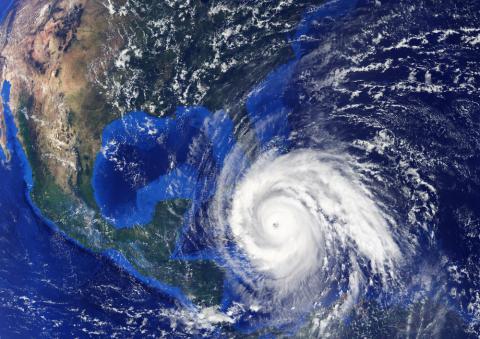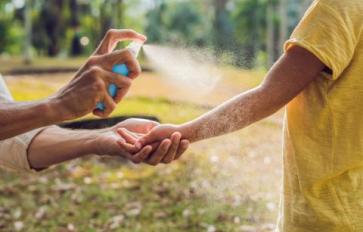
With Hurricane Harvey and Hurricane Irma's recent devastation across the southern U.S., it's a good reminder that it’s important to prepare for the worst. No one wants to be hit by a hurricane, but being unprepared can seriously hurt you. You may not believe that the hurricane will hit at all, but it's always better to be safe than sorry. While this guide cannot guarantee your safety, it can surely help you in making smart decisions. I suggest you follow it as closely as you can, and if you suspect even the slightest chance of being hit by a hurricane, prepare in advance. You'll thank yourself later.
Stock up on non-perishable food
In a hurricane, it's important to have access to food that's hassle-free to make. You should buy enough food and water to last for a few days, ideally one week. Try getting canned food that doesn't require adding water or milk to it. Water bottles are another good option to invest in. Either way, make sure to check expiration dates on food to make sure it's fresh. Avoid any perishable items, and if you already have perishable foods in your fridge, try to eat those first. There's always the chance you will lose power and when that happens, food in the fridge and freezer could go bad. A good idea is to make sure your fridge and freezer are stocked up: The more food you have in there, the better it will retain the cold temperature for longer. Also, be sure to buy some bags of ice, as this will help keep things cold longer, should the power go out. If you do lose power, do your best to not open the fridge or freezer door too much. Only open it when you have a set idea on what it is you need from it. This will help keep the foods cold longer, and prevent the cold from escaping quicker.
Make sure you have all the necessities
Make sure to stock up on necessities like toiletries, light sources, first aid kits, can openers, medicine, and hygiene kits. Buy as much as your family will need to last at least a week. Make sure you stock up on plenty of batteries as well, so you can power any flashlights or other necessities you may need (like a radio). Also, it might be a good idea to print out a medical aid guide so that you know how to administer proper care if the need arises. Here's one by the Red Cross we recommend printing out and having handy. To see what your first aid kit should include, read up about it here. Also, consider learning some first aid for not just people, but pets too. If you're not sure exactly what to get in terms of necessities, here's a list you can use as a guide.
Bathroom Essentials
- Toilet paper
- Body soap
- Shampoo
- Conditioner
- Toothbrushes
- Mouthwash
- Toothpaste
- Hand soap
- Hand towels
- Feminine hygiene products
General Necessities
- Batteries
- Generator (optional)
- Can openers
- Candles
- Flashlights
- First aid kit
- Prescription medicines
- Pain killers
- Blankets
- Pillows
- Maps of the area
- Cell phone charger
- Multi-purpose tool
- Battery powered radio
- Matches
- Sleeping bag
Learn your evacuation zone
Before you batten down the hatches, it's important to keep your options open. You might be in an evacuation zone where it's safer to leave your house than to stay. Check the websites of your local city and state to find out what evacuation zone you're living in (if any). If you're in zone 1, for example, you'll be notified first if you need to evacuate. The city may order the evacuation of neighborhoods in danger of flooding from storm surge, and they'll start with zone 1, adding more zones as needed. It all depends on the severity of the hurricane. If the hurricane isn't too severe, and you're in a higher zone level (like zone 7), you probably won't have to evacuate at all. Still though, in case you do, check the websites of your local city and state to find out information on what roads they advise people to use in case of escaping from a hurricane zone. Make sure to thoroughly check all the options they provide to see which ones would be best for your area. You might want to even write the ones they suggest down, just in case the power goes out and you cannot access the website again. Also, be sure to find any local evacuation centers that you could take shelter in, should you need to. Your city is bound to have some (just a quick google search will help with that). That said, if you're not in an evacuation zone, prepare to bunker down for the night.
Secure your home's windows
If things get really bad, you'll probably want to secure your home's windows. Depending on the category of the hurricane, it might be a good idea. At the very least, you need to close all windows (and exterior doors). You might want to invest in hurricane shutters, but if not, plywood works just as fine. This will help ensure your property suffers less damage. If you are going to do this, don't wait until the last minute. Do it before the hurricane comes your way so that you're not outside while the storm is picking up. Here's a good guide as to how to secure your windows with plywood (and other materials) properly.
Stay on top of the news
The only real way to be sure of what's going on outside is to pay attention to the news. This will help you decide if you should evacuate or stay in your current location. Pay close attention to your local news channel and the weather channel. It's also a good idea to have a battery-powered radio nearby, just in case the power goes out and you need to stay in the loop. While hurricanes are slow movers, it's best not to take things too leniently. Finalize your plans a few days before the hurricane hits and you should be fine. Hurricanes are known to pick up speed or shift course unexpectedly though, so prepare for anything. Staying on top of the forecast by watching, reading, or listening to news will give you an edge and help keep you and your family safe.
Plan the location you will evacuate to (should you need to)
If you are forced to evacuate your own home, be prepared. Grab only the essentials you feel you will most need. Have a to-go bag ready, filled with the essentials we talked about earlier (like first aid, light sources, food, etc.) that are easy to transport. If you live in an evacuation zone, the government may issue a message telling you to evacuate at any time. It all depends on the severity of the storm. Unfortunately, you have to be aware of this. Plan ahead by talking to a friend or relative who isn't in an evacuation zone and has a house that's deemed safe: See if you can bunker down with them, if need be. If none of your friends or relatives live in safe spots, head to the closest evacuation center you can find and take any necessities you need with you. It is a good idea to keep some cans of gasoline, flares, physical maps, and jumper cables handy in your car. If you do evacuate, make sure to take any important documents with you such as medication lists and pertinent medical information, proof of address, deed/lease to home, passports, insurance policies, and birth certificates. A good idea might be to invest in a waterproof and fireproof safe to store all this information in and take it with you that way. Either way, sometimes the unexpected can happen, and even those who thought they were safe can be forced to evacuate. Expect the unexpected and you will, at the least, have an advantage over those who do not.








